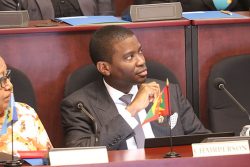Dear Editor,
There were several responses to former President Jagdeo’s comments about a resurgence of anti-Indian sentiment at Pandit Reep’s funeral. Some of the comments were well intentioned while others were biased.
Writers queried whether the timing and the place was appropriate to make such a charge. I remember during the struggle against the illegal PNC government during the 1970s to 1992 in New York, comments were made about whether certain events (like Phagwah, Diwali, Bhagwat, Koran Sharief, Christian services, Havans, weddings, temple services, etc) were appropriate to raise matters pertaining to Guyanese human rights violations. The same was said to Dr Martin Luther King when he was fighting injustice in America. If we had to worry about the right place to protest, demonstrate, distribute literature and speak out against evil, we would have never restored democracy. I had many negative experiences about the right place to protest. We were thrown out of temples, Koran Shariefs, Holi and Diwali celebrations, funerals, etc, when we raised the issues of rights abuses at these functions. But we persevered and continued these activities anyway because there was virtually nowhere else to address an audience. Those Pandits who were with Burnham were instrumental in throwing us out of temples. It was Pandits like Prakash Gossai, Satish, Ramlall, Rishi Ram, etc, who embraced our struggles and welcomed us in their mandirs to discuss Guyanese issues. When we picketed Gowkarran Sharma at a temple, some Hindus felt it was inappropriate. When we rallied against Desmond Hoyte, Ptolemy Reid and other PNC Ministers at the UN, catering halls, etc, PNC supporters felt it was inappropriate. We were lambasted for speaking out against injustices.
Photographers took our photos at various rallies and harassed us when we arrived at Timehri. So where is a right place to voice a strong opinion against a wrongdoing or to hold a protest? As Vassan would always advise us, the right location for a protest or to voice an opinion is where there is an audience. So a funeral is as good a place as any other for Mr Jagdeo to speak out against a perceived resurgence of anti-Indian sentiment. There could not be a better place than to speak about anti-Indian racism than at Pandit Reep’s funeral where there was a large gathering and foreign diplomats. Pandit Reep spent his entire political life fighting political, racial and religious discrimination.
Mr Jagdeo must be applauded for demonstrating the courage to speak out against an issue he feels strongly about. Mr Jagdeo is not a bigot or a hypocrite. He spoke his mind. He perceived an anti-Indian problem and he spoke about it.
Some of letter writers queried whether there does indeed exist anti-Indian sentiment and asked for specific empirical cases. Only those who feel, experience or observe anti-Indian activities can speak about the subject. Mr Jagdeo observed anti-Indian sentiment and spoke against it.
SN noted in an editorial (April 1) that it is inappropriate for Mr Jagdeo as a former President to speak on these kinds of issues and should remain quiet and act as an elder statesman. I disagree. If President Jimmy Carter had remained an elder statesman and not intervened in many affairs of state in the US, racism would have remained firmly entrenched. If Nelson Mandela had not spoken out against selective attacks against Indians, Zimbabweans and other ethnic groups in South Africa, these would have continued unabated.
It is because a statesman like Mr Jagdeo speaks out against what he has perceived as wrong, that attention has been brought to it and hopefully a solution will be found. It is hoped that whatever resurgence of anti-Indian sentiment is taking place will be nipped in the bud as now it has been brought in the open.
Yours faithfully,
Vishnu Bisram





